
The silver-ground carpet is a moth of the family Geometridae. The species was first described by Michael Denis and Ignaz Schiffermüller in 1775. It is common throughout the Palearctic region including the Near East and North Africa.It is found in a variety of different habitats and occurs, for example, in humid forests, moorland and shore areas, on embankments or on unimproved grass meadows and heathlands as well as in gardens.

The mottled umber is a moth of the family Geometridae. It is common throughout much of the Palearctic region. The species was first described by Carl Alexander Clerck in 1759.

The Ourapterygini are one of the large tribes of geometer moths in the subfamily Ennominae. The tribe was described by Charles Théophile Bruand d'Uzelle in 1846. They are particularly plentiful in the Neotropics. Ourapterygini are generally held to be the youngest tribe of their subfamily, and at least seasonally have characteristic apomorphic asymmetrical processes of the anellus.

Macaria notata, the peacock moth, is a moth of the family Geometridae. It is a Holarctic species.
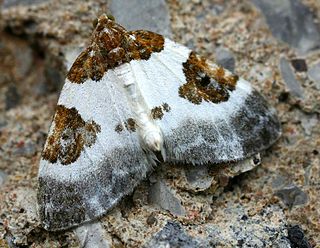
Plemyria rubiginata, the blue-bordered carpet, is a moth of the family Geometridae found in Europe and across the Palearctic. The moth was first described by the Austrian lepidopterists Michael Denis and Ignaz Schiffermüller in 1775.
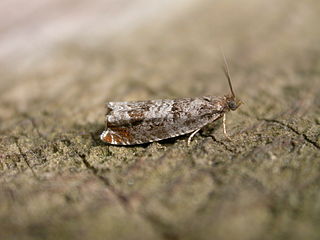
Ancylis achatana is a moth of the family Tortricidae. It is found from central and southern Europe including the United Kingdom and Ireland, east to the Baltic region, Asia Minor, Ukraine and Russia to the southern part of Trans-Ural.

Syncopacma cinctella is a moth of the family Gelechiidae. It is found in all of Europe, Asia Minor and North Africa. In the east, the range extends through Siberia to the Russian Far East.

Epinotia nisella is a moth of the family Tortricidae which is found in the Palearctic, Europe and North America. It was first described by Carl Alexander Clerck in 1759.
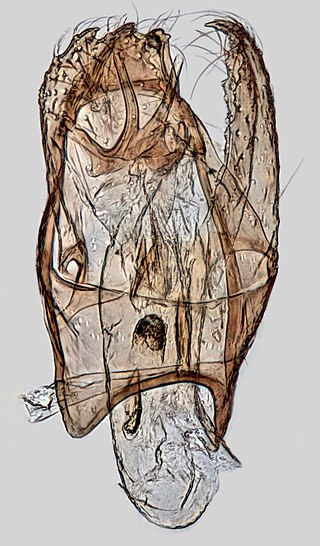
Stigmella obliquella is a moth of the family Nepticulidae which feeds on willow and can be found in Asia and Europe. It was first described by Hermann von Heinemann in 1862.

Epione vespertaria, the dark bordered beauty, is a moth of the family Geometridae.

Cosmopterix pulchrimella, the beautiful cosmopterix moth, is a moth of the family Cosmopterigidae. It is known from the United States and Canada. It is also present in the Palearctic realm, where it is known from the Mediterranean Basin, from Portugal to the western Transcaucasus, north to Switzerland and Hungary. It has also been recorded from the Azores, the Canary Islands and Madeira. It has recently been found in southern England.
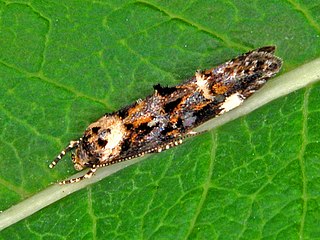
Mompha conturbatella, also known as the fireweed mompha moth, is a moth in the family Momphidae found in Asia, Europe and North America. It was first described by Jacob Hübner in 1819.
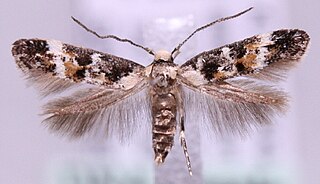
Mompha lacteella is a moth in the family Momphidae found in the Palearctic including Europe.

Nemophora congruella is a species of moth in the family Adelidae.

Acraea jodutta, the jodutta acraea, is a butterfly in the family Nymphalidae. It is found in Guinea, Sierra Leone, Liberia, Ivory Coast, Ghana, Togo, Nigeria, Cameroon, Equatorial Guinea, São Tomé and Príncipe, Gabon, the Republic of the Congo, the Central African Republic, Angola, the Democratic Republic of the Congo, Sudan, Uganda, Kenya and Ethiopia.

Cochylichroa atricapitana, the black-headed conch, is a moth of the family Tortricidae. It is found in China (Xinjiang) and the eastern Palearctic and most of Europe.

Eucosma cana, the hoary bell, is a species of moth of the family Tortricidae.

Philonome lambdagrapha is a species of moth of the family Tineidae. It is found in French Guiana.

Philonome curvilineata is a species of moth of the family Tineidae. It is found in French Guiana.
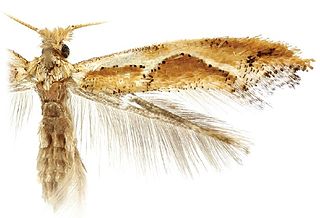
Philonome kawakitai is a species of moth of the family Tineidae first described by Jae-Cheon Sohn, Donald Davis and Carlos Lopez-Vaamonde in 2015. It is found in French Guiana.



















